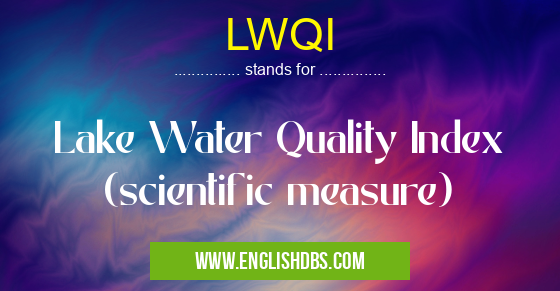What does LWQI mean in STATISTICS
LWQI stands for Lake Water Quality Index. It is a scientific measure that assesses the overall health and quality of a lake's water. The index considers various physical, chemical, and biological parameters to provide a comprehensive evaluation of the lake's water quality.

LWQI meaning in Statistics in Academic & Science
LWQI mostly used in an acronym Statistics in Category Academic & Science that means Lake Water Quality Index (scientific measure)
Shorthand: LWQI,
Full Form: Lake Water Quality Index (scientific measure)
For more information of "Lake Water Quality Index (scientific measure)", see the section below.
LWQI Meaning
Introduction
Lakes are vital ecosystems that provide numerous ecological, recreational, and economic benefits. However, human activities, such as urbanization, agricultural runoff, and industrial discharges, can significantly impact water quality, posing threats to aquatic life, human health, and the overall health of the lake ecosystem.
Components of LWQI
LWQI is a composite index that incorporates multiple parameters to assess water quality. Common parameters included in LWQI are:
- Physical Parameters: Transparency, color, temperature, dissolved oxygen
- Chemical Parameters: Nutrients (nitrogen, phosphorus), pH, alkalinity
- Biological Parameters: Chlorophyll-a (algae), fecal coliform bacteria, macroinvertebrates
Calculation and Interpretation
LWQI is typically calculated using a weighted average of the individual parameter scores. Each parameter is assigned a weight based on its importance in determining water quality. The index value ranges from 0 to 100, with higher values indicating better water quality.
Applications of LWQI
LWQI is a valuable tool for:
- Water Quality Monitoring: Tracking changes in water quality over time and identifying potential pollution sources
- Lake Management: Developing and implementing strategies to improve and maintain water quality
- Public Information: Providing clear and concise information to the public about the quality of lakes
- Water Policy Development: Informing policy decisions related to water protection and restoration
Conclusion
LWQI is a comprehensive scientific measure that provides an objective assessment of lake water quality. It helps stakeholders monitor changes in water quality, identify potential threats, and develop effective management strategies to ensure the health and sustainability of lakes.
Essential Questions and Answers on Lake Water Quality Index (scientific measure) in "SCIENCE»STATISTICS"
What is the Lake Water Quality Index (LWQI)?
The Lake Water Quality Index (LWQI) is a scientific tool used to assess the overall health and quality of lakes. It measures a range of parameters, including biological, chemical, and physical factors, to provide a comprehensive assessment of water quality.
How is the LWQI calculated?
The LWQI is calculated using a formula that combines data from multiple parameters, such as dissolved oxygen, pH, nitrogen, phosphorus, chlorophyll a, and turbidity. Each parameter is assigned a weight based on its importance in determining water quality, and the weighted average of these values is used to calculate the overall index.
What does a high or low LWQI indicate?
A high LWQI indicates good water quality, suitable for swimming, fishing, and other recreational activities. A low LWQI suggests poor water quality, potentially posing health risks or impairing aquatic life.
How can the LWQI be used?
The LWQI is a valuable tool for lake managers, policymakers, and the public to:
- Track changes in water quality over time
- Identify areas of concern and prioritize restoration efforts
- Inform decisions about land use and development
- Educate stakeholders about the importance of water quality protection
Are there limitations to the LWQI?
While the LWQI is a widely used and reliable indicator of water quality, it has some limitations. It does not measure all potential contaminants and may not fully capture the complexity of lake ecosystems.
How often is the LWQI updated?
The frequency of LWQI updates varies depending on the specific lake and monitoring program. Some lakes may be monitored and updated annually, while others may be monitored less frequently.
